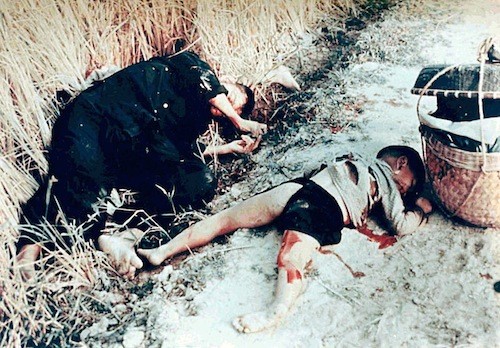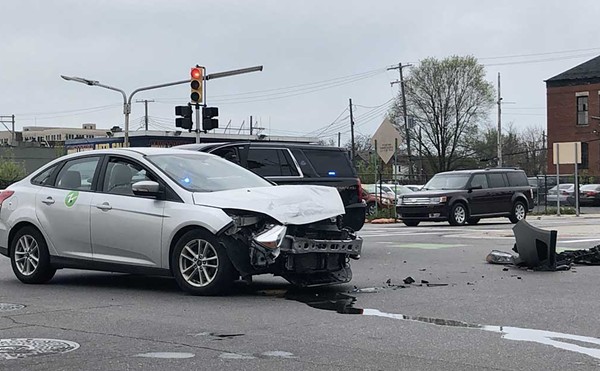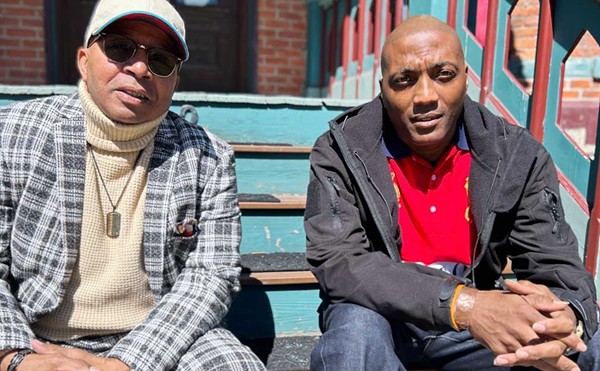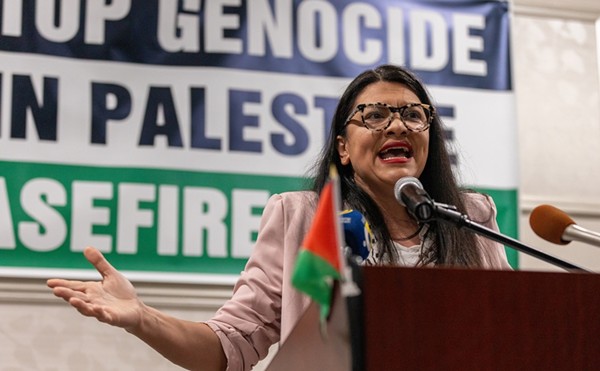On March 16, 1965, a German-born Detroit librarian and former Wayne State University educator named Alice Herz staged a protest against the escalation of the Vietnam War. That evening, she chose a spot outside the Federal Department Store at the corner of Oakman and Grand River avenues in Detroit, where she set herself on fire, the first American to protest the escalating war via self-immolation. A friend of hers stopped and put the fire out, but she died 11 days later from the burns. She left a suicide note explaining that she was protesting "the use of high office by our President, L.B.J., in trying to wipe out small nations,” and that she wanted to call attention to this problem "by choosing the illuminating death of a Buddhist."
In an eerie coincidence, three years later to the day, on the morning of March 16, 1968, a detachment of U.S. soldiers arrived at a number of hamlets designated My Lai in central Vietnam. The soldiers of Charlie Company had been briefed the night before that all the residents would be gone to market, and that the villages would be occupied solely by enemy forces. They understood they were free to go in with their guns blazing. Many hardly needed the encouragement, as they were eager to get even for all the friends they’d lost to sniping and booby traps over the last several months.
From the action's first moments, it was a one-sided massacre. Some villagers were shot in the fields by approaching U.S. troops. Others were rounded up and killed one by one, shot in the head. Another group was ushered into an irrigation ditch and shot in the readymade grave. Some mothers perished as they covered their children, who then emerged from underneath the corpses only to be shot to death themselves.
When it was all over, as many as 504 unarmed Vietnamese civilians lay dead, including men, women, children, and infants. U.S. soldiers raped women and mutilated corpses. After the villagers were killed, the hamlets were set on fire.
It was by no means the only massacre of the Vietnam War. It is alleged to have been the largest. The Pentagon was able to successfully keep the incident out of public view for about 18 months, but in the end, it was one massacre that couldn’t be covered up forever. In the public news coverage that followed, at least one officer faced justice: That was 2nd Lt. William Calley, who was tried in a court-martial and found guilty of murdering 22 civilians.
As journalist Jeffrey St. Clair noted last month, “After the trial of Lt. William Calley, more than 70 percent of Americans believed his sentence was too severe. Most objected to any trial at all. In the end, Calley served less than four years under house arrest for his role in the execution of more than 500 Vietnamese villagers.”
It seems Americans, who demand political action when bullets begin flying across the schoolyard at home, have often had bland reactions to the deaths of children abroad, especially when the kids have the bad fortune to not be white. The establishment’s line often seems to be: “Tough shit, kids. The price is worth it.”
“So what’s the big deal if a couple kids die while we’re beating back the red hordes? You can’t make an omelet without breaking a few eggs?” So goes the Archie Bunker view of the war, best summed up as, “We would have won if not for having one hand tied behind our balls by the politicians, and the other by the dirty hippies who spit on our brave troops as they came home.” (Despite no incident of spitting yet proved.)
There’s a less hard-hearted view of the Vietnam War, of course. It was on view in the latest Ken Burns documentary, which held that the war was a “mistake.” In our zeal to defeat international Communism and Sino-Soviet “aggression,” the United States got suckered into a quagmire in the Gulf of Tonkin, when our forces were suddenly and deliberately attacked by the dirty VC. (This, of course, later turned out to be fictitious; too bad Burns and crew still haven’t heard.)
There is, of course, another view of the Vietnam War: It was an adventure of choice, a chance for U.S. imperialists to pick the low-hanging fruit of Indochina, where the waning French influence was setting the stage for self-determination, which in that day and age meant a polity that would likely vote for the leftists who’d resisted Western intervention. Ho Chi Minh was Vietnam's George Washington. U.S. meddling in the area would bring no good. Even in the mid-1960s, a good number of decent Americans saw trouble brewing in Washington’s choice to amp up military involvement in Southeast Asia.
The war, that awful massacre, and the courageous protests of Herz and others will be the subject of a presentation by former Wayne State University professor Dr. Fran Shor this Friday at University of Detroit Mercy. It's worth noting two of the groups sponsoring the presentation, Peace Action and the Women’s International League for Peace and Freedom are both groups that Alice Herz's daughter, Helga, was involved with. Though Alice and Helga are gone, and the war is just a memory, people pushing for peace continue their work.
It makes sense that they should support an effort to re-examine the war Herz gave everything to oppose. Dr. Shor’s lecture promises to offer a critical look at how the Vietnam War is remembered and evoked, which should include some of those differing “views” of the war mentioned above. The war, which the Vietnamese call “The American War,” has lessons for us evident in the continuing wars the country just seems to have the worst luck getting into — and not getting out of — including the quagmire of Afghanistan, which has now surpassed the Vietnam War as the longest U.S. military engagement in history.
Dr. Fran Shor, Wayne State University Professor Emeritus, will offer a presentation about My Lai at 7-9 p.m. Friday, March 16, in Room 120 in the Engineering Building; free and open to the public; enter on Livernois, parking available in Lot D; click here for a map of campus. The event is co-sponsored by Peace Action of Michigan, Women’s International League for Peace and Freedom of Michigan and Phi Alpha Theta (History Honor Society) of U of D Mercy.
Get our top picks for the best events in Detroit every Thursday morning. Sign up for our events newsletter.






